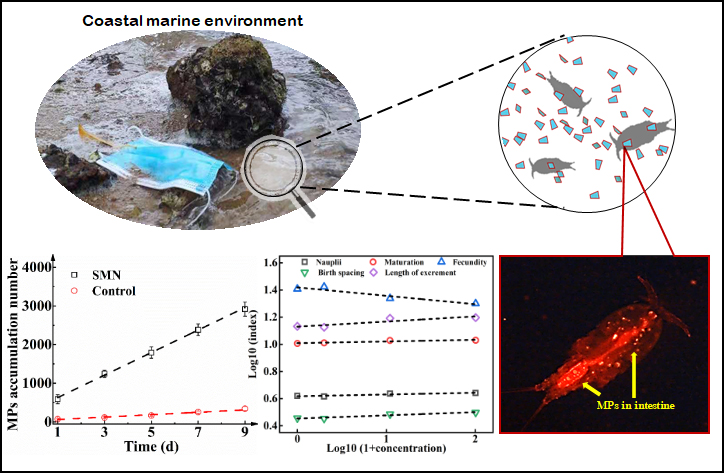Involved Members: Dr. Henry Yuhe HE, Prof. Paul Kwan Sing LAM, Prof. Kenneth Mei Yee LEUNG
Surgical masks (SMs) are the most commonly used personal protection equipment during the COVID-19 pandemic. Due to their vast application and inappropriate disposal worldwide, SMs could potentially bring a serious pollution of microplastics (MPs) into coastal marine environments. This study aimed to investigate the kinetic release of MPs from polypropylene SMs (PP-SM) in seawater and evaluate the chronic toxicity of the MPs to the marine copepod Tigriopus japonicus. Based on the kinetic study results and available relevant data, we estimated that SMs discarded throughout the year 2020 would lead to at least 117 trillion MPs entering the coastal marine environment globally, with a release rate of 415 billion MPs per day. Our results also demonstrated that the copepods ingested the MPs released from PP-SMs, resulting in a significant decline in their fecundity. The results evidently suggested the MPs released from improperly discarded SMs could pose a long-term domino effect on coastal marine ecosystems. To minimize the risk of this emerging threat, better environmental management, policy and law enforcement for ensuring proper disposal of SMs are deemed to be necessary.
Reference:
Sun, J., Yang, S., Zhou, G.J., Zhang, K., Lu, Y., Jin, Q., Lam, P.K.S., Leung, K.M.Y. & He, Y.H. (2021). Release of microplastics from discarded surgical masks and their adverse impacts on the marine copepod Tigriopus japonicus. Environmental Science & Technology Letters, 8(12), 1065-1070.
